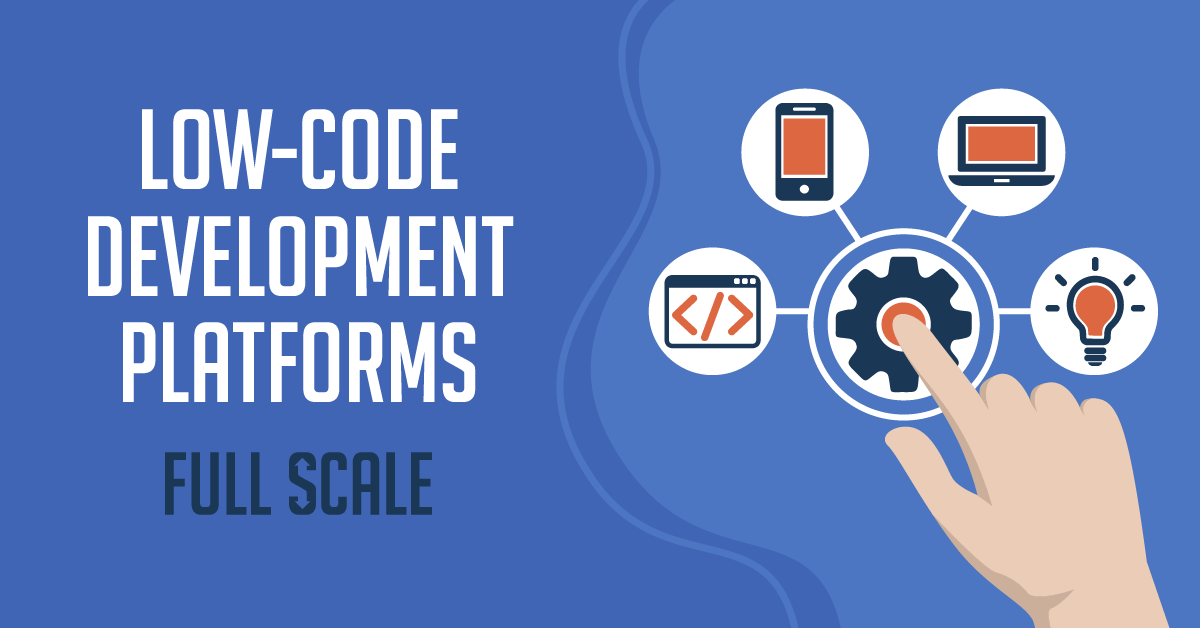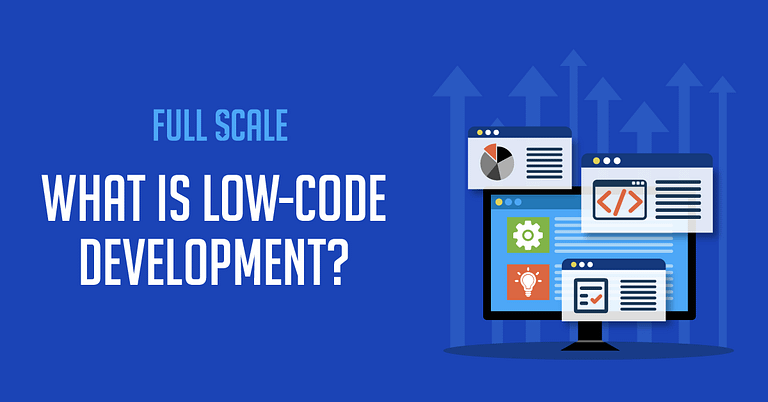Last Updated on 2024-10-11
What are low-code development platforms? Learn how these software development tools boost business productivity.
Tech innovations are all about speed and efficiency. Companies are constantly looking for ways to build new software at the lowest cost and the fastest timeline possible. This is why there has been a surge in demand for low-code development platforms in recent years. Businesses are gradually switching to these tools for software development. And by 2027, the global low-code platform industry is expected to be worth roughly $65 billion.
No-code and low-code development platforms enable developers to quickly and efficiently create applications in a visual software development environment. The fact that little to no coding skill is necessary to construct applications to solve business problems makes it a valuable tool for business.
These low-code development platforms are revolutionizing software development by making it easier and more accessible for non-technical users to construct custom apps. These platforms are especially beneficial to enterprises that require the rapid development and deployment of specialized applications to satisfy unique requirements.
Businesses that want to succeed must find new ways to increase productivity. Investing in low-code platforms could be a modern solution to this quest. In this blog post, we’ll look at what low-code and no-code development platforms are, the advantages they provide, and how they’re transforming the software development process.
What Are Low-Code Development Platforms (LCDP)?
No-code/low-code development platforms are visual software development environments that allow enterprise developers and citizen developers to drag and drop application components, connect them, and construct mobile or web apps. These platforms are frequently used interchangeably with the development methodologies they embody.
Low-code and no-code modular techniques allow developers to create apps quickly by eliminating the need to write code line by line. They also allow non-software professionals such as business analysts, office managers, small-company owners, and others to construct and test applications. These individuals are capable of developing applications with little to no knowledge of traditional programming languages, machine code, or the development work that goes into the platform’s configurable components.
The major selling point of low-code platforms is simplicity; choose a system known for minimal onboarding without a steep learning curve, an intuitive UI, and user-friendliness.
Best Low Code Platforms of 2023

1. Mendix
Mendix is an award-winning low-code application development platform that uses a visual interface and pre-built components. At its core, it reduces the requirement for programming skills while developing apps.
Mendix offers an IDE through which users of all skill levels can begin developing applications. The IDE allows for customization to meet your needs, collaboration via Git-based version management, automatic testing and debugging, light and dark settings, and other features. Developers can use the low-code platform’s expanded AI and ML capabilities to create smart apps and streamline processes, such as co-developer bots (MxAssist) and the Mendix ML Kit.
2. OutSystems
OutSystems is an omnichannel low-code platform, which allows businesses to create applications for a number of mediums.
OutSystems is unique in that it is a low-code solution with tremendous flexibility, allowing developers to design complicated apps with little to no coding experience. This feature decreases the development team’s burden and allows non-technical users to participate in the development process. Moreover, the platform is extremely adaptable, allowing developers to write new code as needed. This implies it may be used to build applications of any complexity, ranging from small mobile apps to massive business systems.
Some of the platform’s most coveted features include real-time performance dashboards, solid security measurements, and the ability for rapid development.
3. Appian
Appian is a low-code automation platform that lets businesses optimize processes, automate jobs, boost efficiency, and build applications quickly.
Appian is simple to use and allows you to build apps rapidly. Part of this is due to the simple and user-friendly UI. The developer tool speeds up the app development process and leads to faster deployment. Appian also excels in access control, which improves security and provides flexibility in opening doors to people with varying roles.
4. Quickbase
Quickbase is a workflow creation LCDP. It’s ideal for assisting teams in finding solutions to bottlenecks and reforming operations.
Quickbase is a great tool for optimizing business operations and increasing productivity, with a wide range of functionality and customization possibilities to match the demands of practically any organization. Quickbase is simple to use, with straightforward drag-and-drop tools for developing unique databases and workflows.
This platform also offers no-code options. Not to mention, the platform’s prebuilt marketplace and handy third-party interfaces are major strengths.
5. Zoho Creator
Zoho Creator is a low-code application development platform that allows developers to transform ideas into apps using simple drag-and-drop features graphically. The developer tool comes with hundreds of pre-built integrations for extensibility, and it can automate processes and incorporate AI without requiring code.
This low-code platform is straightforward with its drag-and-drop capability, making app creation easier. The 600+ third-party interfaces provide a lot of flexibility, and the automation is useful for saving time on daily tasks. Zoho Creator also dramatically accelerates app creation and deployment.
What’s In Store for Low-Code Development Platforms?
Given the several benefits low-code development platforms bring, and the wide variety of use cases, low-code development technologies are bound to become even more popular. If you want to keep up with competitors, your business will have to start adopting this technology even in its early stages.
Exploring new technologies can be intimidating, especially if you’re not a technical founder. Fortunately, you can partner with companies like Full Scale to better grasp how you can benefit from the newest tools in the market.
Work with Full Scale
Want to build software for your business? You can build a dedicated team of software developers with the help of Full Scale.
Full Scale is the go-to choice for businesses looking for quality and affordable software development services. We are a software development company that provides manpower solutions through outsourcing.
We are one of the fastest-growing companies in the United States. Over five years in the business, we’ve helped countless enterprises grow their team and complete their software development projects. We connect our clients with seasoned software development experts who are equipped to take on various projects. Our goal is to ensure you get the best development experts in the industry.
So, what are you waiting for? Start your software development journey with Full Scale!
Talk to An Expert Now

Matt Watson is a serial tech entrepreneur who has started four companies and had a nine-figure exit. He was the founder and CTO of VinSolutions, the #1 CRM software used in today’s automotive industry. He has over twenty years of experience working as a tech CTO and building cutting-edge SaaS solutions.
As the CEO of Full Scale, he has helped over 100 tech companies build their software services and development teams. Full Scale specializes in helping tech companies grow by augmenting their in-house teams with software development talent from the Philippines.
Matt hosts Startup Hustle, a top podcast about entrepreneurship with over 6 million downloads. He has a wealth of knowledge about startups and business from his personal experience and from interviewing hundreds of other entrepreneurs.





